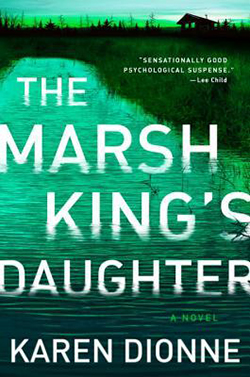
Staff Pick: The Marsh King’s Daughter by Karen Dionne
Not being one much for thrillers, I was a tentative reader of the early chapters but became engaged by the protagonist Helena’s detailed descriptions of the marsh. She was a child born in captivity to her mother, who was abducted when she was fourteen by Helena’s father.
The varied twists of the plot involve an escape, a new family, another escape, a hunt, and a struggle to the death, but that wasn’t what got me. It was the setting, the rich detail, the broken characters.

Helena’s mother was a diminished person. A more romantic telling would have shown her mother developing into a fierce woman, rising above this adversity, and stealing away from the abuser with her daughter. Sadly, abduction, child abuse, and domestic violence rarely end that way. We know almost nothing about her inner life because this is not her story, but also because her true self and her maturity were stunted by her captor.
Her captor was Jacob Holbrook, the Marsh King. Jacob was born to impatient, somewhat abusive parents. He was a poor student, short-tempered, but also a clever outdoorsman, owing to his paternal Ojibwe descent. The dynamic between him and his parents, his lack of belonging in the community, and his dogged resourcefulness prepare him for a life on the edges. Not wanting to be completely alone he kidnaps a teenage girl, and they have a daughter. Due to complications at birth, she is destined to be an only child
On the surface, Helena didn’t have many feelings for her mother, but, deep down, she loved her. She admired and loved her captor’s father because he taught her everything and gave her his full attention. Helena recognized he could be cruel and violent to her mother, and to her, for example, the times he punished her by leaving her in an empty well. Regardless, Helena’s admiration for the Marsh King never ceased. She knew nothing of his history, and he gave her power in the dense, creature-filled wilderness, which lives on in her long after she and her mother return to society, her father to prison.
Helena’s character was fierce and enigmatic, and at times I felt uncertain about her. She created imaginary friends based on old issues of National Geographic, and they advised her when she began doubting the Marsh King, accompanying her through her eventual escape. Her awkward re-entry into everyday life felt plausible, but I did not feel the same way about her hidden identity.
I felt close to the characters and it seemed like I knew them before I read this book. I recognized their dimensions and emotions: sadness, hurt, anger, fear, ego, naivete humility, desperation, resentment, competitiveness, and ambition.
The book was well received, and the film version, which will be released this year, is directed by Neil Burger. We’ll see, but I doubt it will hold a candle to the book.
Jennifer Moore is head of data services at the University Libraries.
